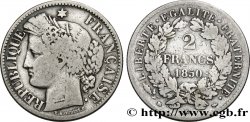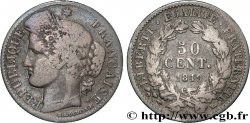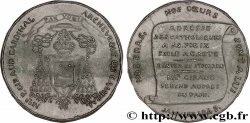E-auction 305-224545 - fme_400158 - II REPUBLIC Médaille pour la mort de Denys Auguste Affre
Чтобы принять участие в торгах, вы должны войти в систему и стать подтвержденным участником аукциона. Войдите, чтобы сделать ставку. Ваш аккаунт будет подтвержден в течение 48 часов. Не ждите до закрытия торгов, чтобы зарегистрироваться.Сделав ставку на данный товар, вы вступаете в юридическое соглашение на покупку выбранного товара и нажатием кнопки «Сделать ставку» подтверждаете принятие вами условий интернет-аукционов cgb.fr.
Ставка может бить сделана только в полном эквиваленте евро. Торги закроются согласно времени, указанному в описании товара, все ставки, сделанные после закрытия торгов, учитываться не будут. Не следует откладывать предложение вашей ставки до последнего момента, так как система может не успеть обработать вашу заявку, и ваша ставка не будет принята. Более детальную информацию вы найдёте здесь: FAQ по интернет-аукционам.
БЕСПЛАТНО.
БЕСПЛАТНО.
| Оценить : | 150 € |
| Цена : | 31 € |
| Максимальная предлагаемая цена : | 211 € |
| Конец торгов : | 18 February 2019 18:20:30 |
| Участников : | 4 Участников |
Тип Médaille pour la mort de Denys Auguste Affre
Дата: 1848
Монетный двор / Город: 75 - Paris
Металл: tin
Диаметр: 51 mm
Ориентация осей монеты: 12 h.
Вес: 33 g.
Век: lisse
Комментарии о состоянии
Médaille en étain avec une patine hétérogène mais des reliefs néanmoins assez nets
Лицевая сторона
Аверс: легенда: R-F.
Аверс: описание: Écu de la ville de Paris sur fond de canons et de drapeaux.
Обратная сторона
Реверс: легенда: LA VILLE DE / PARIS À LA MÉMOIRE / DE DIS AFFRE DIGNE / ARCHEVÊQUE BLESSÉ / MORTELLEMENT À LA / BARRICADE DU FG ST / ANTOINE MORT LE / 27 JUIN 1848.
Реверс: Описание: Légende en huit ligne horizontales.
Комментарий
Denys Auguste Affre, né à Saint-Rome-de-Tarn (Aveyron), le 27 septembre 1793, et mort à Paris, le 27 juin 1848, fut le 126e archevêque de Paris.
Pendant les insurrections de juin 1848, il crut que sa présence près des barricades pût être un moyen de ramener la paix. Il en fit part au général Louis Eugène Cavaignac, qui le mit en garde contre les dangers qu’il courait. « Ma vie, répondit-il, a peu de valeur, je la risquerai volontiers. » Le 25 juin, les tirs ayant cessé à sa demande, il apparut sur la barricade à l’entrée du Faubourg Saint-Antoine, accompagné par M. Albert, de la Garde nationale, habillé comme un ouvrier et arborant une branche verte en signe de paix, et par Pierre Sellier, un domestique qui lui était dévoué. Ses deux vicaires généraux, Antoine Jaquemet et Jules Ravinet, futurs évêques de Nantes et de Troyes, étaient également présents sur les lieux mais auraient été séparés de lui dans la confusion générale.
Il fut accueilli dans la stupeur, mais à peine eut-il prononcé quelques mots qu’un coup de feu relança les hostilités. On l’amena au presbytère de Saint-Antoine, et il fut ramené le lendemain à l'hôtel Chenizot au 51 rue Saint-Louis en l'Ile, devenu sa résidence depuis 1846, où il mourut le 27 juin, vers 4h30 du matin..
Pendant les insurrections de juin 1848, il crut que sa présence près des barricades pût être un moyen de ramener la paix. Il en fit part au général Louis Eugène Cavaignac, qui le mit en garde contre les dangers qu’il courait. « Ma vie, répondit-il, a peu de valeur, je la risquerai volontiers. » Le 25 juin, les tirs ayant cessé à sa demande, il apparut sur la barricade à l’entrée du Faubourg Saint-Antoine, accompagné par M. Albert, de la Garde nationale, habillé comme un ouvrier et arborant une branche verte en signe de paix, et par Pierre Sellier, un domestique qui lui était dévoué. Ses deux vicaires généraux, Antoine Jaquemet et Jules Ravinet, futurs évêques de Nantes et de Troyes, étaient également présents sur les lieux mais auraient été séparés de lui dans la confusion générale.
Il fut accueilli dans la stupeur, mais à peine eut-il prononcé quelques mots qu’un coup de feu relança les hostilités. On l’amena au presbytère de Saint-Antoine, et il fut ramené le lendemain à l'hôtel Chenizot au 51 rue Saint-Louis en l'Ile, devenu sa résidence depuis 1846, où il mourut le 27 juin, vers 4h30 du matin..








 Cообщить об ошибке
Cообщить об ошибке Распечатать страницу
Распечатать страницу Отправить мой выбор
Отправить мой выбор Задать вопрос
Задать вопрос Consign / sell
Consign / sell
 Информация
Информация



